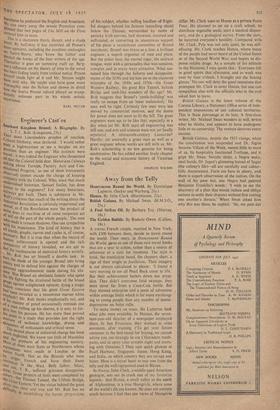Away from the Telly
Hunza. By John Clark. (Hutchinson, 21s.)
A YOUNG French couple, married in New York, with £300 between them, decide to travel round the world. Their story, in Honeymoon Round the World, gives us one of those rare travel books that are a spur to action, rather than a source of reference or a cure for insomnia. The style is brisk, the translation banal, the chapters short, a sign of their origin as fenilletons. Their imagery is not always calculated to please : '1 found it very moving to see all Pearl Buck come to life: But their achievement batters down our preju- dice. They didn't overcome fetid swamps; they were never far from a Coca-Cola bottle. But they showed enterprise and a sense of adventure within average limits which is far more encourag- ing to young people than any number of manic- depressives on balsa rafts.
To make money en route, the Lapierres took what jobs were available. In Mexico, the seven- teen-year-old director of a newspaper employed them. In San Francisco, they worked as sales assistants, after training. (`To get your future customer in the best mood for buying, we cannot advise you too strongly to use Chlorodent tooth- paste, and to spray your armpits night and morn- ing with Odorono.') They cast quick glances at Pearl Harbour, Singapore, Japan, Hong Kong, and India, on which country they are savage and bitter. Here is a travel book to tear one from the telly and the well-signposted road to Blanes.
In Hunza, John Clark, a middle-aged American geologist, sets out to crush one of my favourite legends: that Hunza, a small valley to the north of Afghanistan, is a true Shangri-ja, where none of the world's ills are known. He does not entirely crush because I feel that our views of Shangri-la differ. Mr. Clark went to Hunza as a private Point Four. He planned to set up a craft school, to distribute vegetable seeds, start a medical dispen- sary, and do a geological survey, From the start, he incurred everyone's hostility. Compared with Mr. Clark, Pyle was not only quiet, he was self- effacing. Mr. Clark reaches Hunza, where many of the people had never heard of the United States or of the Second World War, and begins to dis- pense sulpha drugs. As a sample of his attitude to the Hunzans; I may quote this: 'Everyone felt in good spirits that afternoon, and as work was. over by four o'clock, I brought out the boxing gloves.' No one will deny the good intentions that prompted Mr. Clark to enter Hunza, but one cart sympathise also with the officials who in the end asked him to leave.
British Guiana is the latest volume of the Corona Library, a Stationery Office series of inde- pendent impressions of our colonial territories_ This is State patronage at its best. A first-class writer, Mr. Michael Swan wanders at will, writes what he thinks, and appears to have undergone little or no censorship. The venture deserves every success.
British Guiana, despite the 1953 risings, when the constitution was suspended and Dr. Jagan became Villain of the Week, means little to most of us. Its hospitality fascinated Trollope, and it grips Mr. Swan. Swizzle sticks, a Negro wake, steel bands, Dr. Jagan's glistening hatred of Sugar (the colony's life)—all are carefully and colour-. fully documented. Facts are here in plenty, and there is superb observation of the natives. On the wall of his poor hut, one Negro had painted Benjamin Franklin's words : wish to see the discovery of a plan that would induce and oblige nations to settle their disputes without first cutting one another's throats.' Wben Swan asked him why this was there, he replied: 'Sir, me puts dat
dere 'cos me has frien's who should know about dal.' This is a book which makes a serious addi- tion to colonial literature, and is a first-rate work in its own right.
The Golden Bubble and A Fool Strikes Oil are both accounts of fairly recent visits to the Middle East. In each the background is oil, and the characters are the same: sheikhs with seven- figure Incomes, merchants with fifty Cadillacs, strutting English who surely can't be as bad as they behave. Miss Toy's is a superficial account, largely dominated by an archly-named Land- Rover. But for sand in the carburettor it could be an account of a tiring journey to St. Ives. Mr. Owen's narrative, The Golden Bubble, though it tries to cover too much, makes a realistic attempt to assess the problems of the Persian Gulf. It is a balanced, readable and understanding impression of the Arab world, with few axes ground. His style is racy, and too often he muddles us with changing tense. He is very critical of the English abroad : 'The atmosphere of amateur colonialism is more easily felt than described; it appears in sudden resentments, a feeling of almost personal slight when the sheikhs pursue their own policies.'
DAVID STONE















































 Previous page
Previous page